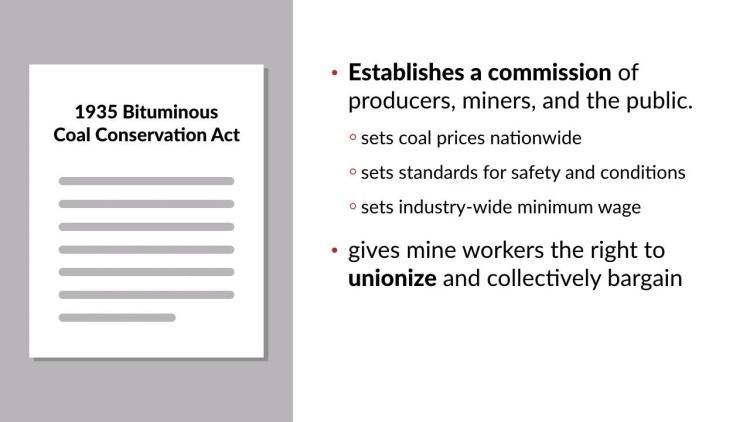Carter v. Carter Coal Co.
United States Supreme Court
298 U.S. 238 (1936)
- Written by Megan Petersen, JD
Facts
Congress passed the Bituminous Coal Conservation Act (BCCA) to create a national commission of coal miners, coal producers, and private citizens to help regulate the coal-mining industry by establishing standards for fair competition, production, wages, hours, and labor relations. The BCCA delegated to the commission the power to fix the minimum and maximum prices of coal at every mine in the United States. Additionally, the labor-relations provisions of the BCCA gave coal-mine employees the right to organize and enter into collective-bargaining agreements in all states. Although compliance with the BCCA was purely voluntary, Congress encouraged compliance by rewarding participating coal mines with a tax rebate for abiding by the BCCA’s provisions. Carter (plaintiff) sued his own company, Carter Coal Co. (defendant), to enjoin it from paying the required tax for noncompliance under the BCCA.
Rule of Law
Issue
Holding and Reasoning (Sutherland, J.)
Concurrence/Dissent (Hughes, J.)
Dissent (Cardozo, J.)
What to do next…
Here's why 907,000 law students have relied on our case briefs:
- Written by law professors and practitioners, not other law students. 47,100 briefs, keyed to 996 casebooks. Top-notch customer support.
- The right amount of information, includes the facts, issues, rule of law, holding and reasoning, and any concurrences and dissents.
- Access in your classes, works on your mobile and tablet. Massive library of related video lessons and high quality multiple-choice questions.
- Easy to use, uniform format for every case brief. Written in plain English, not in legalese. Our briefs summarize and simplify; they don’t just repeat the court’s language.





